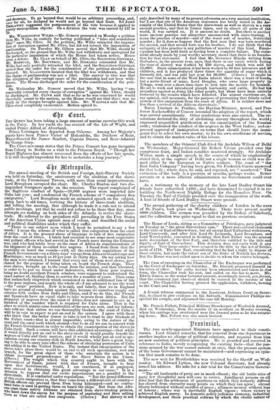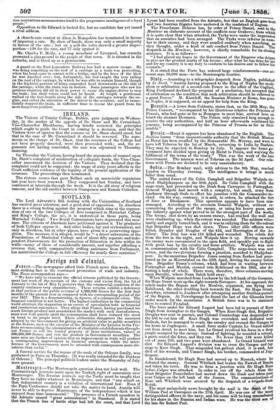Vtutrintiol.
The two newly-appointed Ministers have appealed to their consti- tuents. Lord Stanley remarks, that his removal from one department to another implies no change of political relations, and requires from him no new assertion of political principles. He is guarded and reserved in reference to India, merely recognizing the existing facts—that the pas- sions aroused by the war cannot /subside at once, that the present system of the home Government cannot be maintained—and expressing an opin- ion that much remains to be done.
The new writ for Hertfordshire was received by the Sheriff on Wed- nesday. Sir Edward Lytton, the new Colonial Secretary, had already issued his address. He asks for a fair trial for the Conservative Govern- ment-
"The old landmarks of party are in much effaced ; the old battle cries of party few thoughtful men will care to revive. Intelligent persons on all sides find that the settlement of questions on which they formerly differed has cleared from obscurity many points on which they can agree • abroad liberty befriended without sacrifice of peace ; alliances secured wit.hout loss of honour ; where war is inevitable English vigour ; where victory is achieved English mercy. In domestic policy judicious economy, industrial development, and those practical reforms by which the elastic nature of free institutions accommodates itself to the progressive intelligence of a loyal people." Opposition to Sir Edward is looked for, but no candidate has yet issued a rival address.
A church-rate contest at Alton in Hampshire has terminated in favour of imposing a rate. By show of hands, there was only a small majority in favour of the rate ; but on a poll the votes showed a greater dispro- portion-138 for the rate, and 77 only against it.
Mr. Charles P. Melly, a young merchant of Liverpool, has recently presented a playground to the people of that town. It is situated in the suburbs, and is fitted up as a gymnasium.
A guard on the East Lancashire Railway has had a narrow escape. He was doing something on the roof of a carriage as a train was proceeding, i when his head came in contact with a bridge, and by the force of the blow he was knocked over; but, fortunately, his foot caught the iron railing on the roof of the carriage, by which he was able to sustain himself, though in the frightful position of being suspended head downwards on the side of the carriage, while the train was in motion. Some passengers who saw his perilous situation did all in their power to cause the engine-driver to stop the train ; but their voices could not be heard. At length a gentleman walked on the foot-boards along the side of the carriages towards the en- gine, and called the attention of the driver to the accident, and he imme- diately stopped the train, in sufficient time to rescue the guard from his most dangerous position.



































 Previous page
Previous page